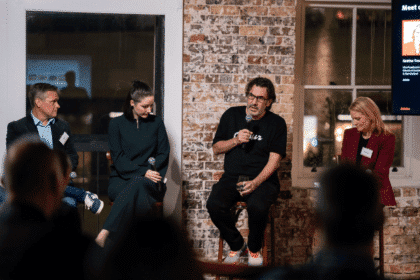The digital ad industry is rarely standing still but there has rarely been so much hand-wringing in the sector as it faces a near-existential crisis with looming changes to the Privacy Act, third-party cookies and other global regulation changes.
Speaking at the Interactive Advertising Bureau’s (IAB) Data and Privacy Summit, the industry body’s director of policy and regulatory affairs Sarah Waladan (pictured above), said that the proposed changes to the Privacy Act leave a lot to be desired for adland — and potentially raises more questions than providing answers.
“The most recent discussions we’ve had with the government have shown that they’re still pursuing a broad opt-out right from receiving any content or advertising based on targeting,” she told a packed house in Sydney.
Central to Waladan’s (and the IAB’s) concerns over the new bill were a lack of nuance around targeting and cohorts, as well as a test that would require adtech players to prove that their collection, sharing and deployment of customer data was “fair and reasonable” — essentially, a Pub Test.
“Targeting is [currently] defined as inclusion or exclusion of an individual in any sort of cohort, regardless of the nature or size of the cohort. The problem from our perspective is that putting data into cohorts is fundamental to how the online ecosystem works,” she explained.
Waladan and many others in the sector have been banging this drum for a while, telling B&T after last year’s IAB Data and Privacy Summit that the Privacy Act changes could have significant “unintended consequences”.
This time out, Waladan chose to draw attention to consumer targeting that other advertising players get to indulge in.
“We think there will be some nonsensical outcomes. The example provided previously is an organisation would be required to remove individuals from broad operational cohorts like state or local area. This doesn’t make any sense and it is much more restrictive than what occurs in the offline world,” she told the crowd.
“For example, if you’re driving down the freeway and you see a billboard for your local shopping centre, you can’t opt out of that, or if there’s a billboard outside your office. And as far as we know, nobody has any concerns about that.”
The Fair and Reasonable test caught Waladan, and other speakers’ ire.
“The Pub Test is essentially asking the common person what they think about this thing and, therefore, is it fair. Is it reasonable that data is being used this way when they don’t have any expert knowledge or experience working in the marketing industry? Is it something that you could sell to your grandma?” said Richard Knott, GM ANZ of data collaboration and clean room player InfoSum.
“It might sound a little bit frivolous or trivial but, as we’ve discussed, with a Fair and Reasonable test in the Privacy Act it will require some subjectivity. Now, that subjectivity won’t be people down the hall. It will be a judge and that judge will make the decision based on expert testimony but also a general consensus around what people expect to happen.”
However, while the industry is currently fretting about the potential changes, Australia does have a distinct advantage compared to other regions around the world. The European Union was one of the first jurisdictions to jump into comprehensive data privacy regulation with GDPR and the US with California’s Consumer Privacy Act followed later. Waladan and her IAB colleague Jonas Jaanimagi, as well as some other speakers, presented this as a significant opportunity for businesses.
Talking about the IAB’s Global Privacy Platform (GPP), Jaanimagi said that while the Privacy Act will give people a two-year grace period to implement changes, adtech players need to get moving now.
“We’re lucky in terms of timings. We can leverage the pain of Europe’s experiences and everything that Canada has just gone through. Also, be aware that whilst the GPP is currently enabling IAB Europe’s Transparency Consent Framework (TCF) which actually leverages different strings (TC strings) which the GPP has to support, but may they have to evolve away from eventually over to the GPP strings,” he said.
“At some stage in Europe, they’re going to have to do that for themselves to fully embrace GPP and transition. For us, it’s ready to go. Canada has recently implemented it so, again, we can learn from them, India is going through the process right now. What’s happening in the US is slightly different because it’s happening on a state-by-state basis.”
Chris Eden, Google’s head of programmatic media AUNZ, described the industry as being at an “inflection point” and that he was “uncomfortably excited” about the Privacy Act changes, as well as his own employer removing of third-party cookies in Chrome.
Given how many in the room were talking, however, it seems that many were more uncomfortable than excited.








